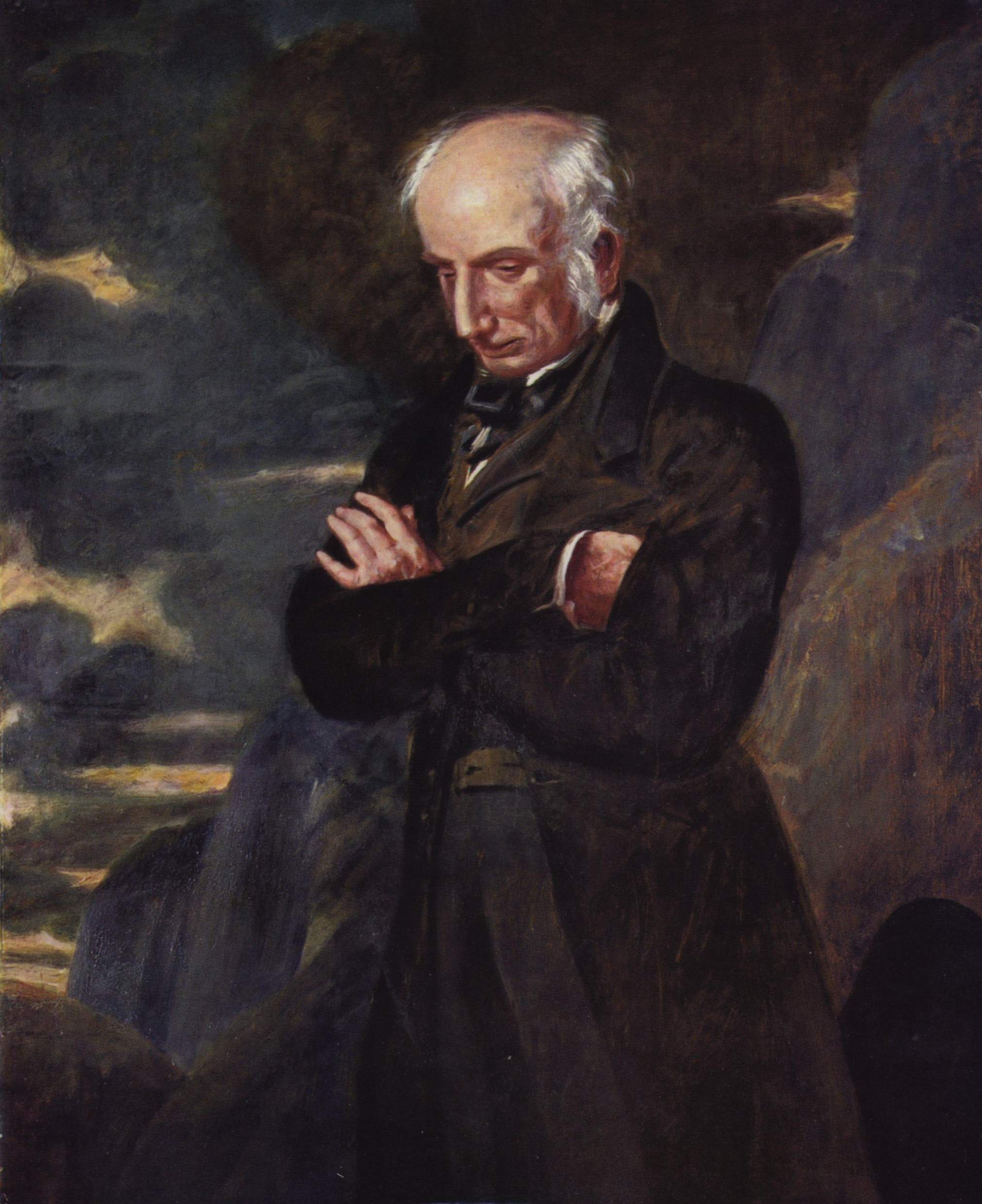“Los placeres recién descubiertos son dulces. Cuando mienten sobre nuestros pies.”
Fuente: To the Same Flower, capítulo 1 (1803).
William Wordsworth fue uno de los más importantes poetas románticos ingleses. Con Samuel Taylor Coleridge, contribuyó a la evolución de la época romántica en la literatura inglesa con su publicación conjunta de Baladas líricas en 1798. Esta obra influyó de modo determinante en el paisaje literario del siglo XIX. Fue el poeta laureado de Inglaterra desde 1843 hasta su muerte en 1850.
El carácter fuertemente innovador de su poesía, ambientada en el sugerente paisaje del Lake District , en el norte de Cumberland, radica en la elección de los protagonistas, personajes de humilde extracción, del tema, que es la vida cotidiana, y del lenguaje, sencillo e inmediato.
Wordsworth, Coleridge y Southey fueron conocidos como lakistas, por inspirarse en el mismo paisaje de los lagos.
Wikipedia

“Los placeres recién descubiertos son dulces. Cuando mienten sobre nuestros pies.”
Fuente: To the Same Flower, capítulo 1 (1803).
“Dulces dias infantiles, que eran siempre. Veinte días son ahora.”
Como una mariposa (I've Watched You Now a Full Half-Hour), sección. 2 (1801).
Fuente: http://www.gutenberg.org/browse/authors/w#a2879
“El arte es expresión de los sentimientos y emociones del artista.”
A Narrow Girdle of Rough Stones and Crags, l. 37 (1803).
Fuente: http://rpo.library.utoronto.ca/redirect/fromlink.cfm?new=poet/363.html
“Men who can hear the Decalogue, and feel
To self-reproach.”
The Old Cumberland Beggar.
Bartlett's Familiar Quotations, 10th ed. (1919)
Stanza 3.
Lyrical Ballads (1798–1800), Lines written a few miles above Tintern Abbey (1798)
“Something between a hindrance and a help.”
Michael. A Pastoral Poem, l. 189 (1800).
Lyrical Ballads (1798–1800)
“The best of what we do and are,
Just God, forgive!”
Thoughts suggested on the Banks of the Nith.
Bartlett's Familiar Quotations, 10th ed. (1919)
“What we need is not the will to believe, but the wish to find out, which is its exact opposite.”
This was not Wordsworth's viewpoint at all. The words are in fact those of Bertrand Russell in his Sceptical Essays (1928), p. 157.
Misattributed
“Fair seedtime had my soul, and I grew up
Fostered alike by beauty and by fear.”
Bk. I, l. 301.
The Prelude (1799-1805)
“And 't is my faith, that every flower
Enjoys the air it breathes.”
Fuente: Bartlett's Familiar Quotations, 10th ed. (1919), Lines written in Early Spring.
“Meek Walton's heavenly memory.”
Part III, No. 5 – Walton's Book of Lives.
Ecclesiastical Sonnets (1821)
“And now I see with eye serene
The very pulse of the machine.”
Stanza 3.
She Was a Phantom of Delight http://www.bartleby.com/145/ww259.html (1804)
“Stern Daughter of the Voice of God!”
Stanza 1.
Ode to Duty http://www.bartleby.com/145/ww271.html (1805)
“That inward eye
Which is the bliss of solitude.”
Stanza 4.
I Wandered Lonely as a Cloud http://www.bartleby.com/145/ww260.html (1804)
“Oh, be wise, Thou!
Instructed that true knowledge leads to love.”
Quote reported in Hoyt's New Cyclopedia Of Practical Quotations (1922), p. 419-23.
Lines (1795)
Force of Prayer.
Bartlett's Familiar Quotations, 10th ed. (1919)
She Dwelt Among the Untrodden Ways, st. ? (1799).
Bartlett's Familiar Quotations, 10th ed. (1919)
Stanza 3.
Lyrical Ballads (1798–1800), Lines written a few miles above Tintern Abbey (1798)
“Sweetest melodies
Are those that are by distance made more sweet.”
Personal Talk, Stanza 2.
Bartlett's Familiar Quotations, 10th ed. (1919)
“The gentle Lady married to the Moor,
And heavenly Una with her milk-white lamb.”
Personal Talk, Stanza 3.
Bartlett's Familiar Quotations, 10th ed. (1919)
“Bright gem instinct with music, vocal spark.”
A Morning Exercise.
Bartlett's Familiar Quotations, 10th ed. (1919)
To Toussaint L'Ouverture, l. 12 (1807).
“Have I not reason to lament
What man has made of man?”
Fuente: Lyrical Ballads (1798–1800), Lines Written in Early Spring, st. 6 (1798).
“Earth helped him with the cry of blood.”
Song at the Feast of Broughton Castle.
Bartlett's Familiar Quotations, 10th ed. (1919)